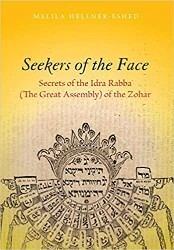Counting the forty-nine days of the Omer, which takes place between the second day of Passover and the start of Shavuot, is based on a biblical commandment about harvesting. During this time, we can prepare ourselves spiritually for Shavuot and do inner work on our souls. In Kabbalah, each week of the seven-week Omer is associated with a different attribute. Each day of these seven weeks is also associated with one of the attributes, or sefirot, making forty-nine different combinations — each representing a part of our selves that has the potential to be improved. Jill Hammer’s newest book, Omer Calendar of Biblical Women, provides us with the perfect guidebook to do just that.
If the book sounds familiar to you, you’re not wrong. Hammer first wrote the calendar in 2003 for Ma’yan: The Jewish Women’s Project of the JCC in Manhattan. It was also posted on Ritualwell. Now, it’s in book form for us to use, learn from, and enjoy.
The sefirot of the Omer include chesed (love or lovingkindness), gevurah (strength or judgment), tiferet (beauty or balance), netzach (endurance, persistence), hod (glory or gratitude), yesod (intimacy), and malchut (royalty or wholeness). Each of these has some variation or nuance that Hammer delves into in her book.
The book is a collection of entries, one for each day of the Omer. All entries focus on a different biblical woman who embodies qualities of the sefirot of that day. It’s an expansive introduction to women of Jewish texts. We read about Miriam, Vashti, Idit, Dinah, Asnat, Batya, Tamar, and Chuldah. We also learn about Devorah, who embodies gevurah shebetiferet—judgment with truth and compassion — and Elisheva, the sister of Nachson ben Aminadav who embodies tiferet shebehod, or compassion within glory. Hammer always includes a short verse from the Bible, enabling readers to find the women’s stories on their own. Less than a full page long, these entries make the practice of counting the Omer accessible. There are also vibrant illustrations of selected women, which break up the text and challenge our preconceived notions about the women’s appearance.
If you’re looking for something new to count the Omer, want to explore the kabbalistic aspects of the ritual, or are interested in learning more about Jewish women of the Bible, Omer Calendar of Biblical Women is a perfect introduction. It’s informative without being overwhelming. And even if Kabbalah isn’t your thing, the book is a wonderful addition to feminist Jewish bookshelves.
Jaime Herndon is a medical writer who also writes about parenting and pop culture in her spare time. Her writing can be seen on Kveller, Undark, Book Riot, and more. When she’s not working or homeschooling, she’s at work on an essay collection.





